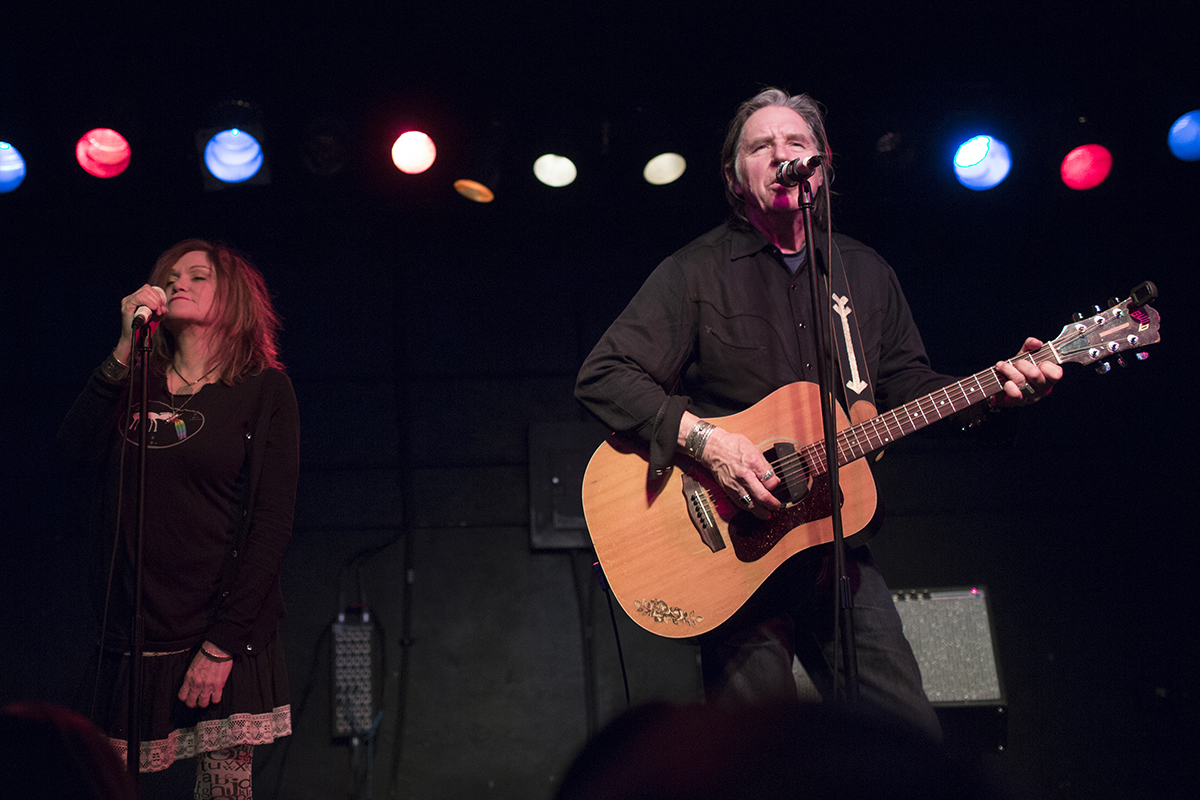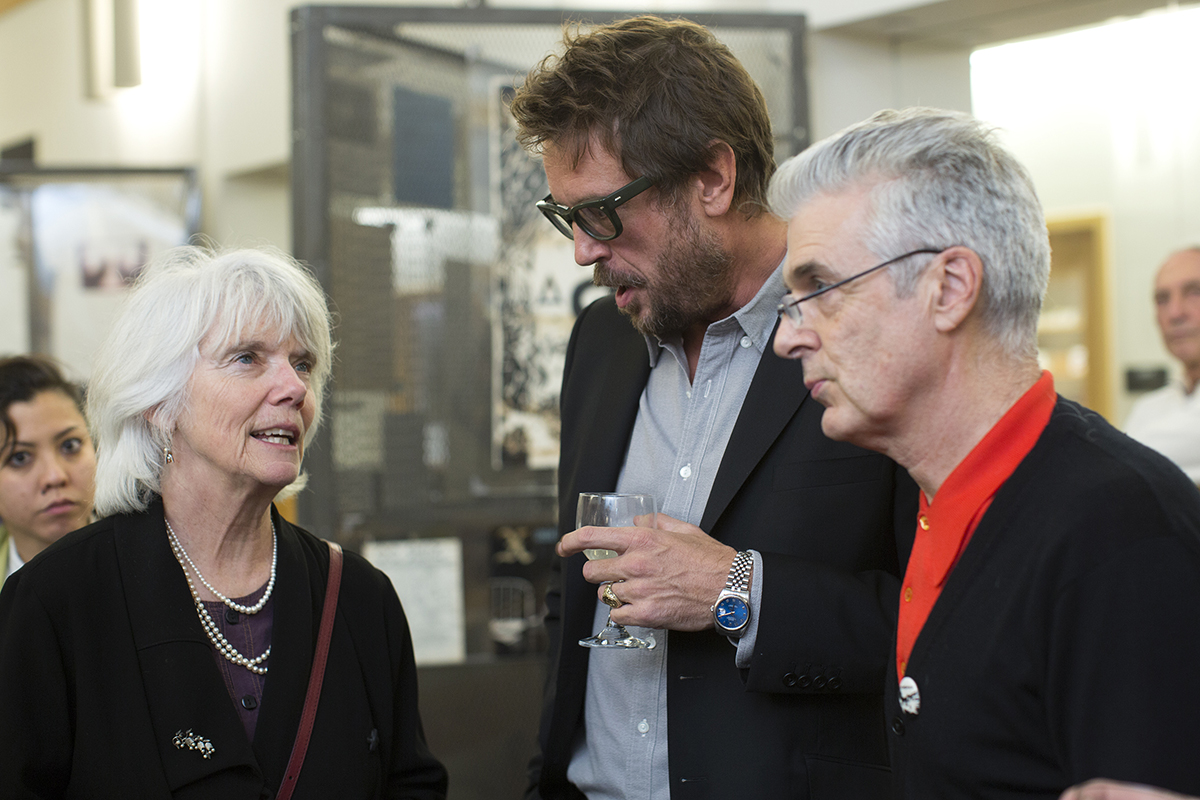'Anarchy in the Archives' puts punk collections on display
By Daniel Aloi

John Doe and Exene Cervenka of the Los Angeles punk band X reflected on punk rock and their lives in music Nov. 4 on campus as part of Cornell University Library’s Punkfest Cornell.
In a conversation in Klarman Hall with music professor Judith Peraino and assistant professor of comparative literature Tom McEnaney, they remembered the diversity of bands and musical subcultures in and around L.A. in the early years of X in the late ’70s.
“Everybody was so different sounding from each other,” Cervenka said. “The Go-Go’s didn’t sound like X. Everybody was really accepting of anything weird anybody wanted to do. The Flesheaters, their songs were crazy.”
Doe said: “The Germs always said we were a bunch of hippies. And I kind of loved, I kind of held onto that.”
While X shared stages with many different bands, they never really fit into one easily defined category. They also shared a love of roots music and made a country record as The Knitters.
“Stuff was moving pretty fast,” Doe said. “From ’77 to 1980, that’s probably about 10 years of real time.”
Peraino and McEnaney co-organized a symposium with panel discussions around Punkfest, the weeklong celebration of the library’s punk collections and new exhibition, “Anarchy in the Archives.”
Peraino asked Doe about his curatorial project, editing the recent book “Under the Big Black Sun: A Personal History of L.A. Punk.” Saying he didn’t want to write a memoir, he and publisher Tom DeSavia solicited chapters from participants in the scene – of which Doe said: “It was a community and a collaboration.”
Cervenka wrote about the cultural revolution going on at the time, Dave Alvin of The Blasters (and X, in the mid-1980s) looked at roots music’s influence on punk, and Jane Wiedlin of the Go-Go’s wrote about the places where people lived and hung out.

“Those were our salons,” Doe said. “Where people sat around and got drunk, or just talked about what was punk rock, what was art, what did you want to do with your life, what do you like about culture, what do you hate about culture.”
“Every city had its great scene. It was really fun to tour then,” Cervenka said. “Punk rock was an incredibly universal thing that every city had their own version of.”
Punk was also a reaction to the dominant culture of the 1970s.
“We all owe Bob Seger and Peter Frampton a great debt,” Doe said. “And you throw in ‘Charlie’s Angels,’ all that really super glossy, feathered hair and all that kind of stuff – it was time. It came to a point where it went from New York to London to L.A. to San Francisco, and Austin and everyplace else, in a year and a half.”
During a Q&A, they were asked: “Is it weird that you started out in 1977 in Venice, California, and now you’re in a collection at Cornell?”
“It’s not weird,” Cervenka said. “The community in this room is here because this is a bunch of people who think this is important.”
After the talk, Doe and Cervenka joined more than 200 other people in Kroch Library’s Hirshland Gallery for the opening reception of the Division of Rare and Manuscript Collections' “Anarchy in the Archives,” celebrating 40 years of punk.
On display through May 2017, the exhibition features bands and artists such as Patti Smith, Sex Pistols, The Velvet Underground, Ramones, Minor Threat and Green Day, with records, posters, photographs, flyers, badges and other memorabilia. Other artifacts include clothing from Sex, entrepreneur Malcolm McLaren’s shop in London; profanity-filled letters to DJs, promoting the Sex Pistols; and a 1974 poster for “Blondie and the Banzai Babies” at Hilly’s in New York (pre-CBGB and pre-Blondie).
Jon Savage, author of “England’s Dreaming: The Sex Pistols and Punk Rock” and a panelist during the weekend, attended the opening. Several items from his personal collection are on view, from 7-inch records to a poster he designed for Joy Division.
Collector and music archivist Johan Kugelberg, instrumental in establishing the Cornell Hip Hop Collection in 2007, also donated materials from 1974-86 as the foundation of the punk archive.
“Maybe all the grassroots culture ultimately is all about people starting from scratch, doing it yourself, and kind of making something out of nothing in a process that’s almost alchemical,” Kugelberg said.
The punk archive is continuing to grow, he said, with, among other holdings, photographs by Glen E. Friedman and zine writer-illustrator-musician Aaron Cometbus’ 1985-2013 Underground Press Collection.
“This is ongoing work … as we’re trying to bring some sort of comprehension to a historical narrative,” he said.
Media Contact
Get Cornell news delivered right to your inbox.
Subscribe